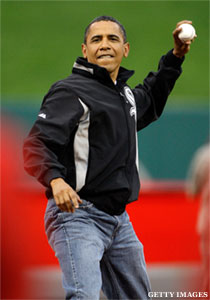Baseball's opening day arrives this week, and it should do so with all the vigor of the NCAA basketball tournament's first round. Wall-to-wall baseball, not a minute to breathe, excitement for the next six months encapsulated in one stacked day. Might as well import Gus Johnson for the afternoon. Anything to remind people: This is an American holiday and ought be celebrated as one.
Instead of fireworks this year, Major League Baseball is offering pull-string poppers. There are six games next Thursday, less than half the number from opening day last year and the fewest since 1986. There are no Red Sox, no Phillies, no Cubs and no Mets. For every Tim Lincecum vs. Clayton Kershaw or Justin Verlander vs. CC Sabathia, there is Jered Weaver vs. Luke Hochevar or Derek Lowe vs. Livan Hernandez.

Sounds more like a Hallmark Holiday.
There is an explanation behind baseball's downsized day, one that, while plausible, is still frustrating. World Series games creeping into November bothered baseball's brain trust, particularly commissioner Bud Selig, and he vowed for it to end in October this year. Fox wanted the series to start on a Wednesday. So MLB pegged Game 1 of the World Series for Oct. 19 and worked backward from there.
Rather than start the season on the traditional Monday -- March 28 would have been the earliest opening day ever -- MLB chose Thursday, which works as the kickoff to March Madness but is hardly a guaranteed score in April. By offering home teams the opportunity to choose whether they wanted to play Thursday or Friday -- most with precarious weather situations took Thursday, and warm-weather and domed teams chose Friday -- they almost ensured the split.
MLB, of course, could've taken matters into its own hands and mandated the Friday start across the nation. For a league that's great at maximizing business opportunities and spotty at connecting with fans in the same emotional way football and even college basketball do, the prospect of a new tradition is intriguing.
Mondays are nice and all, but 15 games on Friday turns opening day into opening weekend, a three-day extravaganza of baseball that would make even the most tepid markets baseball hotbeds. Want to win a younger generation? Give it an event. History, pageantry, all of the things on which baseball relies -- they play well for their older core audience, which is going nowhere, while missing a second consecutive generation being lost to the NFL. The lure of taking off Friday and spending a weekend chained to a stadium with friends and overpriced beer is a whole lot better than ditching work Monday for baseball only to be back in the office the next day.
There wouldn't be a timing issue. Just like Monday, the awkward years -- like when would MLB start next season, March 30 or April 6? -- would be balanced by easy calls. Considering that Selig's desire to end the World Series before November would be in jeopardy by the implementation of another playoff round, March 30 would be the perfect guinea pig for the opening-weekend plan.
Teams are likely to balk at this because the first weekend often sells out in addition to the Monday game, and until school lets out in June, weekday gates are full of weak days in all but the most fertile markets. Opening weekend also would coincide with the Final Four, though Saturday-afternoon games would leave enough leeway for baseball not to make it a pure head-to-head battle.
Even with flaws, it's an experiment worth undertaking, an investment in the sport's future. A $7 billion-a-year industry can't subsist on aging demographics, and though this would be only a small gesture, it's still one that says: We value your experience.
Already MLB provides a flaw in viewing options. What should be entirely engrossing -- hitting a stadium at noon, turning on the MLB.tv app on an iPad, flipping through the available games and supplementing the sounds and smell of actual, live baseball -- instead falls prey in most places to antiquated TV blackout rules. The possibilities for 21st-century baseball fandom are engrossing. Unfortunately, nobody is wielding an iron for the wrinkles.
And so we get six games, the lowest number in 25 years. Only 10 teams played that day. Though let's be honest: Sports are so different now, so ubiquitous, so open sourced, so available, that it's really not a fair comparison. There were no expectations for big productions then. It's the bare minimum today.
Opening day overflows with the history and pageantry baseball relishes, and that's why it deserves more. It's OK to take something good and aspire to greatness. No purist will begrudge that. This isn't a naked profit grab. It's something to rescue opening day.
Because Gus isn't coming anywhere near it the way it looks right now.




